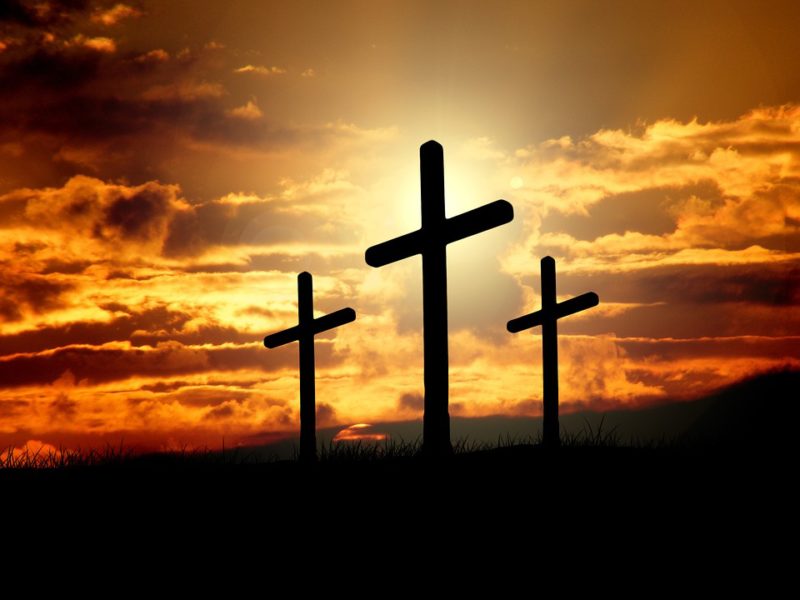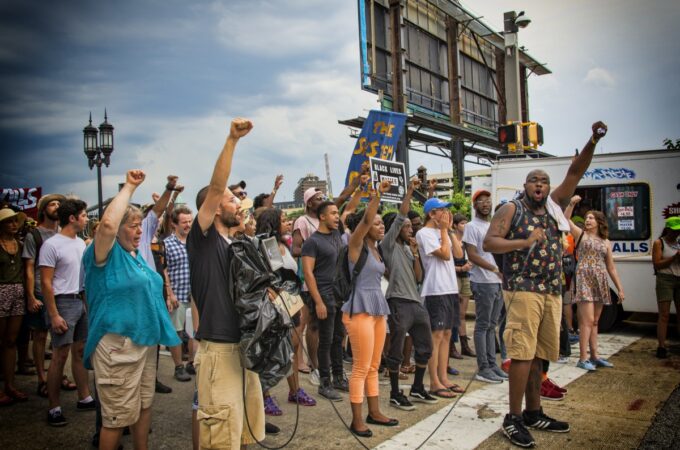What’s driving today’s polarization around race? And what’s the answer?
Two opposite answers—two narratives, if you will—are unfolding. One emphasizes systemic injustice and institutional racism. It views the problems black people face as sourced outside their community and attributes these problems to historic slavery and pervasive, systemic white oppression.
The other narrative emphasizes the importance of personal responsibility; evil is rooted in human hearts. Yes, white racism persists, but much bigger challenges confront the black community, challenges that can be overcome by the actions and decisions of black people in ways that are not ultimately dependent on the actions of white people.
Here’s the latest in our current series, A Dialogue on Racism and Christian Racial Reconciliation.
~
Dear Scott,
We appreciate the invitation, thank you for extending it. While there is much required of our leadership during this year of disruption, it’s good to dialogue on these topics, especially because we have served the same Lord and city for so long. Despite disagreement and misunderstandings, particularly around the area of race and reconciliation, we hope to ultimately stir one another toward greater love of God, service to his church, and good deeds toward those most suffering in our city and nation.
We’d like to start by responding mostly to one part of your prompt, certainly not to dismiss the other questions, which we look forward to engaging with. But it might be helpful to begin with our common ground in our Christian faith and the Story from which we derive our identity, dignity, and purpose. In order to do this, we want to address the assumption that language for systemic injustice and privilege are novel in the last 20 years or so. This assumption is not shared by most non-white Christians, and certainly not shared by the legal and philosophical thinkers from whom these academic categories have come. While we are also continually learning, this lexicon is at  least as old as systems theory itself, about 70 or so years, and perhaps better aged at near 130 years old in the Catholic Church’s social teaching. But it is practically as old as the centuries of prophetic literature confronting the priests and kings in their alliance against the disinherited; as old as Psalm 72 and many other Psalms of rage and imprecation, which record the cries of the oppressed against godless cultural and political violence; as old as the stories of the Kings, and God’s direct call and confrontation regarding their care of the people; and as old as the Pentateuch, which records the creation of Israel from those subjugated by Egypt. The Hebrew Bible is relentlessly political, institutional, and systems oriented, constantly witnessing to the Almighty’s concern with how nations and their leaders legislate and police the people, especially the poor.
least as old as systems theory itself, about 70 or so years, and perhaps better aged at near 130 years old in the Catholic Church’s social teaching. But it is practically as old as the centuries of prophetic literature confronting the priests and kings in their alliance against the disinherited; as old as Psalm 72 and many other Psalms of rage and imprecation, which record the cries of the oppressed against godless cultural and political violence; as old as the stories of the Kings, and God’s direct call and confrontation regarding their care of the people; and as old as the Pentateuch, which records the creation of Israel from those subjugated by Egypt. The Hebrew Bible is relentlessly political, institutional, and systems oriented, constantly witnessing to the Almighty’s concern with how nations and their leaders legislate and police the people, especially the poor.
But our common ground leads us to an even more ancient time, in the Judeo-Christian origin of humanity. We understand the intent of Genesis 3-4 not merely as individual arrogance and violence, but corporate and systemic. It is a summary of the development of culture and injustice. It is no incidental point that the author tells us of the creation of cities, music and the means of production in this passage (4:17, 20-22). In other words, the Ancient Hebraic lexicon has always had these categories of corporate and systemic evil, represented in its characters, culture, and motifs: Adam (Humanity), Eve (Living), Cain (Possessor), Abel (Empty), Lamech (Low): each of these, having specific representative, corporate meaning. This is made explicit by Moses in Genesis 3:20, who told his people that Eve represented all the living.
It would therefore take some explicit text to cause us to interpret the original family in a less than representational and corporate way. In other words, it is clearly the hyper-individualism of our cultural moment that would make us think corporate and systemic responsibility isn’t as old as Adam and Eve themselves. We would need some text to explicitly reframe these ancient Hebraic assumptions of systemic/corporate responsibility in order to make us think the language of systemic policy and policing is something novel. And the New Testament provides no such thing. In fact, the Gospel amplifies this sense of corporate, systemic, and generational responsibility by preaching the gospel of a Human who took all corporate and individual responsibility throughout all history on to Himself on our behalf. This utterly central Christian belief in the God-man taking responsibility for sins he didn’t commit is also the logic that frees us to take responsibility for the least, the last, and the lost in the world, and in our own country.
This whole conversation pushes us to recognize that laws have always been needed precisely because families turn against other families, because kinfolk will absolutely burden others to privilege their own. The cities and nations that  kinfolk build inevitably institutionalize group self-interest as we build up our systems, just as the genealogy of Cain testifies they did in their city-building and their culture-making. And just like Cain justified his murder by individualism (“Am I my brother’s keeper?”), and obscured his guilt with self-pity (“My punishment is more than I can bear”); so have peoples and nations rationalized their abusiveness and played the victim when their injustice is confronted. This is as true of America as any other nation, and Christian theology should we be the first to acknowledge and address this reality.
kinfolk build inevitably institutionalize group self-interest as we build up our systems, just as the genealogy of Cain testifies they did in their city-building and their culture-making. And just like Cain justified his murder by individualism (“Am I my brother’s keeper?”), and obscured his guilt with self-pity (“My punishment is more than I can bear”); so have peoples and nations rationalized their abusiveness and played the victim when their injustice is confronted. This is as true of America as any other nation, and Christian theology should we be the first to acknowledge and address this reality.
So to the point, we all believe in Adam and Eve, and we all know they cannot be understood apart from their corporate meaning for all Humanity and the Living, which is why we call them our parents. We all believe Genesis 6, that sin is so pervasive that wicked humanity of course means wicked society, afflicted by personal indulgence and structural abuse alike. And therefore we ought to continue this interpretive frame into Genesis 3-4, recognizing that Cain represents the Possessing of others’ lives, both individually as well as corporately, and Abel represents the Emptying of innocence by this violent family of families. And what’s more, we see in Genesis 4, in the heritage of Cain to Lamech, the development of art, production, culture and society, and the attending valorization of Lamech’s violent injustice in song (4:23-24). In other words, Lamech’s injustice toward the weak became a bar song of pride and privilege.
My question in response to the concern about a novel lexicon is this: What did Moses mean by Genesis 3-6? I would say it is a simple enough point that we can all agree on, that alongside the development of persons to families to societies to cultures at large, alongside the heritage that institutionalizes the powerful and the powerless, the Possessor and the Empty, there was also development of the dispositional violence and injustice of Lamech. I assume we can agree that Moses wrote this history to teach Israel, the new nation, to not be like Lamech, the old empires. It would take a great amount of eisegesis to not interpret this as Moses’ way to remind his newly liberated people of the powers that had oppressed them; and as what they were to avoid in developing their own heritage and institutions. As we see in Leviticus, Numbers, and Deuteronomy alike, Moses called for socio-religious policies that protected the disinherited and marginalized, even to the point of centering them in the culmination of their annual worship (e.g. Deut 16:11-12).
And so, while we acknowledge the lexicon around systems theory and racialized policies are of the colonial and post-colonial eras, we assume all Christians agree that they highlight tragic, ancient, and universal truths that nations have been systematically cruel to the Abels of history. And we assume we agree that the Scriptures have always opposed precisely these powers and principalities that oppress the poor and poor in spirit. We can also agree that all persons are of divine dignity, and all persons are prone to marginalize others when we organize around socio-ethnic identities. This is what we love about DNA’s work across the world, especially in pursuing agrarian justice among the poor!
We believe that St Paul summarizes the Christian worldview most succinctly toward the end of his life and writings in Ephesians chapter 2, where sin is described as the  pervasive influence by the prince of the power of the air to create hostility between the nations through the very laws and ordinances of those nations. And only by the death of Christ, which tears down the wall of hostility between these “law-abiding” nations, are we all made equal, made family, in Him.
pervasive influence by the prince of the power of the air to create hostility between the nations through the very laws and ordinances of those nations. And only by the death of Christ, which tears down the wall of hostility between these “law-abiding” nations, are we all made equal, made family, in Him.
In light of all that, here are at least initial, simple responses to your other questions:
Q: How do you define racism? How do you define systemic or structural racism?
We’re satisfied with Merriam Webster’s definition. Racism is: 1: a belief that race is the primary determinant of human traits and capacities and that racial differences produce an inherent superiority of a particular race 2 a : a doctrine or political program based on the assumption of racism and designed to execute its principles 2 b: a political or social system founded on racism 3: racial prejudice or discrimination
Q: Do you consider all white people to be complicit in racism in ways that they should feel a sense of moral guilt about?
We’re not convinced that we have a shared understanding of whiteness, complicity, racism, or even how guilt operates individually and structurally, so we can’t answer this question yet. However, we rejoice that the death of Christ takes both corporate and personal guilt into himself, and gives us resurrection life to live boldly now in conflict with the powers and principalities that seek to blind us to our faults, whether intentional or complicit. We assume we can at least agree on Christ’s work for humanity, and our call as emissaries of the kingdom of God to oppose the powers and principalities.
Q: Latasha Morrison in her Be The Bridge curricula uses the words and phrases “white privilege,” “whiteness,” “whitesplaining” and “white fragility.” How do you understand these words/phrases, and their importance in furthering racial reconciliation?
Yes. For the sake of space, we’d like to refer you to Tim Keller’s article published recently called the Sin of Racism. He makes the point that whiteness was a construct (an evil one) devised to justify race-based slavery. He goes on to say, “How does systemic racism actually work? It happens through institutionalizing practices that favor white people and exclude non-white people. When people institutionalize something, they create structures that keep the practice going long after the founders of the practice leave the scene.”
While whiteness is of course not in the Bible per se, it functions quite the same as the powers and principalities that God and his people contended with throughout the Biblical witness. Since our American and ecclesial structures have institutionalized whiteness intentionally and explicitly, it is important for individuals who benefit from this system to become aware of how and why. Part of reconciliation involves confessing, repenting, and resisting unjust structures. Morrison’s terms are helpful to give language to some spaces where the white, evangelical church can begin to name her 400-year history and turn toward something much more faithfully centered on Christ.
Q: Can you clarify what you mean when you say racism covers “every inch of our soil” and is “interconnected to every system?”
Racism, as a philosophical, political, economic and theological concept has been explicitly and implicitly used in the creation of America from the beginning to this day. For reference, The Color of Law by Rothenstein, and The Color of Compromise by Tisby.
Grace and peace,
Andrew Stravitz and Dennae Pierre






